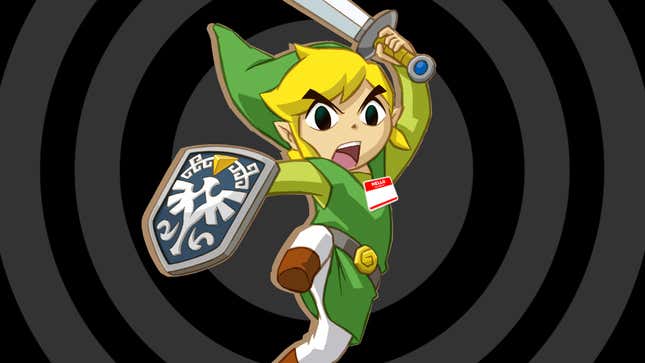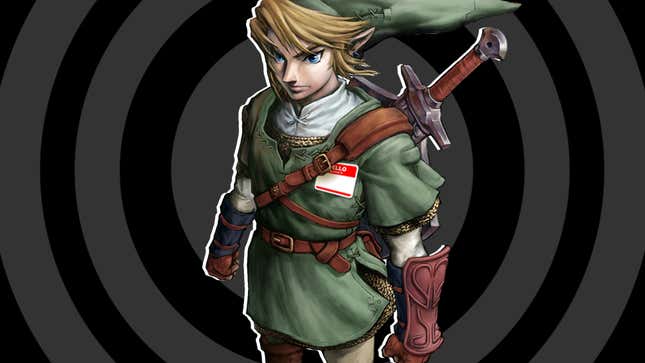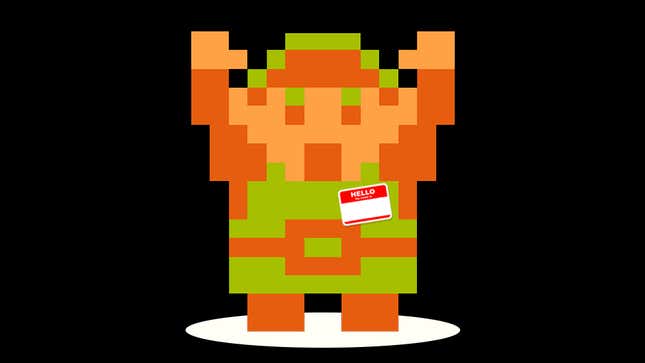
"Link isn't even his real name," a friend told me recently. We were talking about Zelda, and the way people reacted to the new trailer for the next big game in the series.
My friend is more of a Zelda veteran than I. But still, his comment seemed heretical. This is Link we're talking about! He's not some two-bit space marine. Everybody knows who he is. Even lapsed gamers were keeping an ear tuned to E3 this year, hungry for news of the guy's long-awaited console return.
Why is Link named Link? This is one of those questions every newcomer to The Legend of Zelda must face. Asking it is second only to that time-honored tradition of realizing that Zelda doesn't refer to the the guy wielding a sword and shield like a total badass in all the promotional art. I've heard many theories throughout the years. But my friend's answer is the most intriguing I've heard by far.
"Link is just what they put down at the beginning," he continued. "You change it to your own name once you start playing."
The name "Link" is just a placeholder in his view. It's an arbitrary stand-in that was made with the common understanding that players would replace it with their own mark, making themselves the hero in these legends. "Link" even sounds like the perfect referent for this. It's simple, opaque enough to sound like it could be a real name. But the word suggests a bond being established between the little warrior dressed in green and whoever's on the other side of the screen. Plus, it beats seeing "YOUR NAME HERE" plastered across the front of a game's box.
I had never played a Zelda game in any substantive way, but I knew what my friend was getting at. He was referring to the way that some games prompt players to rename a character without giving them any other options to change his or her physical or emotional constitution. It's a funny dynamic that I don't see that much anymore, since many other story-driven games now lean on voice acting, rather than text bubbles, to get their message across. Voice-over work requires names to be more firmly set in stone, because the actors in younger series than Zelda can't predict every possible name players want to assign to the hero of any given story.

The Legend of Zelda games are interesting because they haven't stopped using the old naming convention, however. When my friend began describing his theory about Link's real name, for instance, I thought back to playing Final Fantasy VII in high school. I relished the opportunity to rename that game's spiky-haired sword-wielding protagonist. He wasn't Cloud anymore, he was Yannick. He didn't look, or act, anything like me. But I didn't want him to. I wanted to become Cloud, not the other way around. Switching the names felt amazing, even if I knew it was only a surface-level change.
Things are different for Zelda, though. There was only one Final Fantasy VII. There've been a few more Clouds here and there since that game came out. But no single character in Final Fantasy has risen to the same stature as Link. Zelda has survived with a similar cast of core characters since the first Legend of Zelda came out for the NES in 1986. That means Link is almost 30 at this point, which is ancient in video game years.
He's gone through many changes since his NES days, of course. There have been young Links and teenage ones. Cute Links and serious Links. Lefties and righties. In some games, such as the Nintendo 64 classic Ocarina of Time, there are different versions of Link in the same story.
Trying to chart all these different Links is enough to make your head spin. But the incredible diversity that Nintendo has brought to this one character makes his continued relevance all the more impressive, especially when you consider the company he keeps.
Many other iconic video game protagonists have risen and fallen since the eighties. And many have gone through periodic transformations the same way Link and Princess Zelda have. But if you compare Link to other enduring characters like Mario or Lara Croft, I think Nintendo has achieved something truly unique with its Zelda games, something my friend helped me truly appreciate for the first time.
Take Lara Croft, for instance. Her physical appearance has varied throughout the years as she's appeared in video games, comics, live-action movies, and rebooted versions of all these things. But she's always remained Lara Croft and only Lara Croft. A trailer for the latest Tomb Raider reboot proclaimed that we're all Lara Croft in some idealistic sense. But as much as I loved the new Tomb Raider, I didn't buy that tagline for a second. I like playing as Lara Croft, much in the same way I like playing as countless other heroes in games. But I still know Lara as Lara, the same way I know Mario as Mario.
These games are fun because they allow you to become a famous and superhuman character. Zelda does that. But it also does something else, I'd argue. Something far more profound. The games don't just invite you to become Link. Link also becomes you. Every time one of the Zelda games prompt you to rename the famous hero, they're also inviting Link into a deeply personal inner sanctum of one's own fantasy.

It's a tricky maneuver, and one I'm honestly not sure anyone else has achieved in video games. Part of me has to wonder if Nintendo would have even established the same pattern of allowing players to rename Link if they started making the series today. In either case, the people behind Zelda have made a deliberate choice to keep the tradition alive. The first option you are presented with in A Link Between Worlds, last year's 3DS game and the most recent installment in the main Zelda series, is one asking once again if you'd like to rename Link.
This might all sound basic to seasoned Zelda fans. But the reason I love the detail my friend pointed out, even as someone with limited experience actually playing these games, is that it explains why longtime fans of Nintendo's series hold Link so near and dear to their hearts.
Remember, the only reason I was talking about Link in the first place with my Zelda-playing friend was because the trailer Nintendo brought to E3 had kicked off some serious speculation. People took to the internet immediately after the trailer ended to begin debating what they had just seen. Some wondered if the person in the trailer was Link at all. Most notably, others proposed that Link was going to be a girl in the new game.
This confused me. As a relative outsider to the series, Link has always struck me as a bit androgynous. I assumed this was a deliberate aesthetic choice on Nintendo's part, a way to accentuate the waifish, boyish innocence that makes him such a charming protagonist.
I don't want to put words into the mouths of any Zelda fans. But my friend's argument helped me understand why so many people got caught up in a flurry of excitement about who, or what, the next Link is going to be. Because they were also wondering, on some level, who they were going to be in this new adventure as well.
So: what is Link's real name? He doesn't have any single name. Maybe, slowly, he won't even have a single gender. He's a gathering point for many aspiring heroes, a point people can fixate on but also see themselves reflected in.
Images by Sam Woolley
To contact the author of this post, write to yannick.lejacq@kotaku.com or find him on Twitter at @YannickLeJacq.

